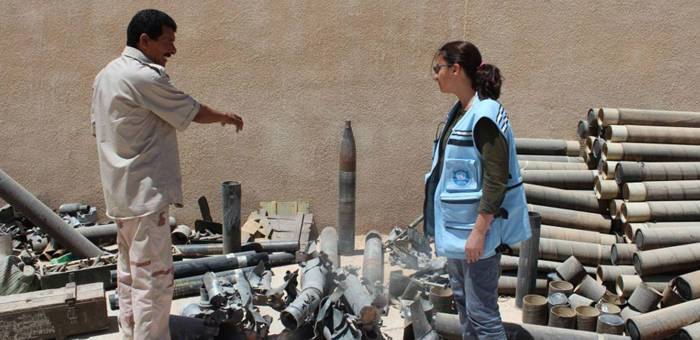UNITED NATIONS — Secretary-General Ban Ki-moon stressed that countries have a historic opportunity to eliminate excessive and poorly regulated weapons transfers through the United Nations Arms Trade Treaty (ATT), which opened for signature Monday at the world body’s headquarters in New York.
“With the ATT, the world has decided to finally put an end to the ‘free-for-all’ nature of international weapons transfers,” Ban said at a special event marking the Treaty’s opening for signature.
“The ATT is substantive and robust, but its effectiveness will depend on the willingness of States to ensure its full implementation.”
Ban appealed to major arms-trading countries in particular to be “first movers” and bring their national legislation in line with the requirements of the treaty, which will come into force 90 days after it has been ratified by 50 nations.
Although the ATT will not control the domestic weapons use, once ratified, it will require states to establish national regulations to control the transfer of conventional arms and regulate arms brokers, among other objectives. “The eyes of the world are watching arms traders, manufacturers and Governments as never before,” Ban said.
“The treaty will provide an effective deterrent against excessive and destabilizing arms flows, particularly in conflict-prone regions,” Ban said. “It will make it harder for weapons to be diverted into the illicit market, to reach warlords, pirates, terrorists and criminals, or to be used to commit grave human rights abuses or violations of international humanitarian law.”
The ATT is the first international treaty regulating the global arms trade. It was overwhelmingly approved two months ago in the U.N. General Assembly by a vote of 154 to three — Democratic People’s Republic of Korea (DPRK), Iran and Syria — with 23 abstentions. The vote was the culmination of a decades-long push to halt illegal shipments of weapons such as missiles, combat aircraft and attack helicopters.
Ban underlined that the ATT brings hope “to millions of women, men and children who live in deprivation and fear because of poorly controlled international arms trade and the proliferation of deadly weapons,” and added that it will also enhance the enforcement of arms embargoes imposed by the Security Council and help promote social and economic development.
During the special event Monday morning, Angela Kane, U.N. High Representative for Disarmament Affairs, said that the day opens “a new chapter in which states will sign up to an international contract bringing responsibility and transparency to the global arms trade.” While the treaty is “not perfect,” she said it is certainly “robust”.






